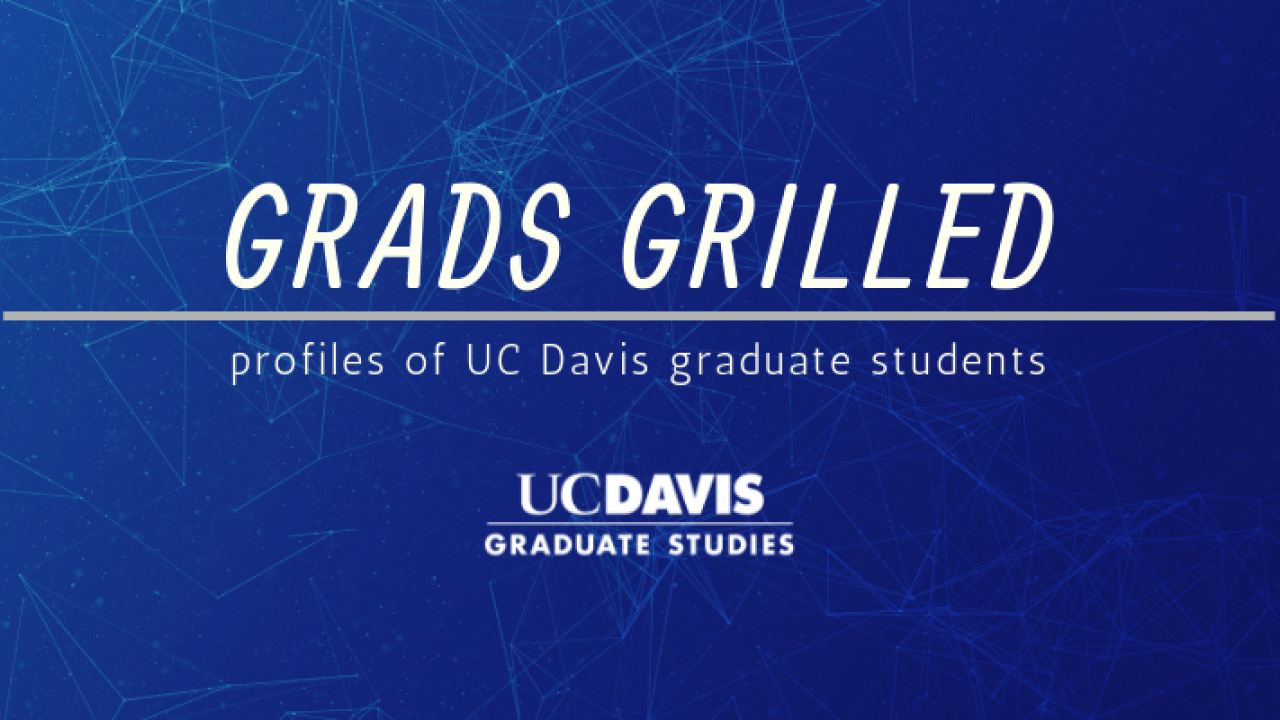
Graduate Student Profile: Alea Corin Skwara, Psychology
Meet UC Davis Graduate Student Alea Corin Skwara
- Department
Psychology
- Program and year of study
Ph.D. (Perception, Cognition, and Cognitive Neuroscience)
- Previous degrees and colleges
BA Theater, Davidson College
- Where did you grow up?
Mainly in a small town called Sylva, near Asheville in the mountains of Western North Carolina
- Where do you live now?
At N Street Cohousing, a retro-fit cohousing community in Davis
- What's your favorite spot in Davis?
The Farmer’s Market and the redwood and oak groves in the arboretum. You might also find me holed up at Mishka’s or Temple.
- How do you relax?
On a day-to-day basis, I play guitar and sing, meditate, read, go to yoga, and cook with my housemates. When I have more time, I go on hikes and backpacking trips in the mountains.
- What was the last book you read for pleasure?
A Human Being Died That Night by Pumla Gobodo-Madikizela
- What TV show are you currently binge-watching?
I am anxiously awaiting new seasons of Broad City and Transparent.
- Research interests
I study compassion and responses to suffering. At the highest level, my research is motivated by the overarching question: What are the qualities of a system that support compassionate responses to suffering? “System” here may refer to many levels of analysis: an individual, a single interaction, a dyadic relationship over time, a whole society, or the meta-system that emerges from the confluence of all these levels.
- Dissertation title or topic
Longitudinal changes in compassion-relevant brain and autonomic nervous system activity over the course of intensive meditation retreat
- Please share a surprising or noteworthy fact or finding from your research
I recently found patterns of longitudinal change in brain activity at rest (when the participant is asked to simply sit without engaging in any sort of directed thought) over the course of a 3-month meditation retreat that mirror changes observed during Shamatha meditation in the same retreat participants. This suggests that observed retreat-related changes in brain activity may not be specific to meditation, but instead could be more domain-general.
- Which professor or class inspired you to pursue graduate studies?
My path to graduate school was a winding one, and it would be impossible for me to name one person or experience that led me here. I had a remarkable Biology teacher in high school (Mr. Beck) who nurtured my love for science, two marriage and family therapists for parents who made explorations of human psychology part of everyday conversation, a life-path-changing encounter with a deeply compassionate Tibetan Buddhist Rinpoche, and the combination of intellectual challenge and support from my now-advisor (Dr. Cliff Saron) during a summer research institute, to name just a few influences.
- Which scholarly text do you wish you had written? Why?
The Moral Imagination: The Art and Soul of Building Peace by John Paul Lederach. This book is John Paul Lederach’s reflections on his long career in peace building, and highlights the importance of bringing one’s full self to the work. It explores the role of imagination in peace building: the ability to envision a world in which you coexist in relative peace with those who have deeply wronged you (the moral imagination). This is an essential read for anyone interested in peace building (but also, I think, for anyone in the sciences, especially those of us who research humans).
- What's the best thing about being a grad student?
The fact that it is literally your job to think deeply about questions that matter to you (and hopefully to the world); the scheduling flexibility.
- What's the worst?
The way that scheduling flexibility can turn into workaholism and constant “I should be working” guilt.
- If you weren't a grad student, what would you be doing?
I probably either would have followed in my parents' footsteps and be a marriage and family therapist, or be working at an organization focused on refugee welfare.
- Finally, please ask yourself a question - "What’s something that surprises people when they learn it about you?"
I used to be an opera singer! This was my main focus through undergrad. I even spent a semester studying vocal performance at L’Ecole Normale de Musique de Paris.
Graduate student profile courtesy of the UC Davis College of Letters and Science.
About Graduate Studies
Graduate Studies at UC Davis includes over 100 dynamic degree programs and a diverse and interactive student body from around the world. Known for our state-of-the-art research facilities, productive laboratories and progressive spirit – UC Davis offers collaborative and interdisciplinary curricula through graduate groups and designated emphasis options, bringing students and faculty of different academic disciplines together to address real-world challenges.
UC Davis graduate students and postdoctoral scholars become leaders in their fields: researchers, teachers, politicians, mentors and entrepreneurs. They go on to guide, define and impact change within our global community.
For information on Graduate Studies’ current strategic initiatives, visit the Graduate Studies strategic plan page.
